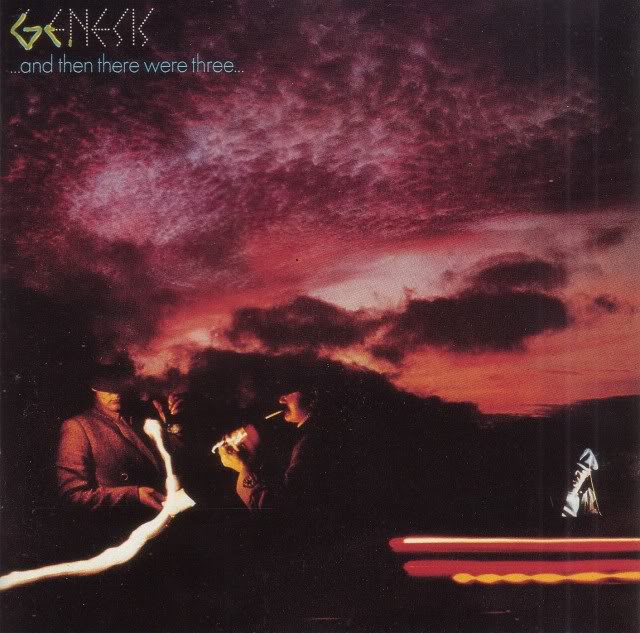
And Then There Were Three (1978)

1.Down and Out
2.Undertow
3.Ballad of Big
4.Snowbound
5.Burning Rope
6.Deep in the Motherlode
7.Many Too Many
8.Scenes From A Night's Dream
9.Say It's Alright Joe
10.The Lady Lies
11.Follow You Follow Me
The first Genesis album where the band was whittled down to a three piece. Hence the title. Banks, Rutherford, and Collins would keep this lineup intact for the next 15 years. After guitarist Steve Hackett left, there was discussion amongst the remaining members whether or not to seek out a replacement, but by now Michael Rutherford had enough playing time to where he could play both bass and guitar in the studio. Plus, the guys seemed the most comfortable at this point. The three remaining personalities were great compliments and counterparts of one another, and time would soon show just how popular the band would become.
That was still many years in the future, though. At this stage they were still more of the art-rocker type. Many that listened to popular music still had never heard anything by them, or heard of them at this point. Whether or not it was the band’s intention, they seem to be purposely trying to alter their craft a bit on this album. All of the songs are of reasonable length – meaning nothing over seven minutes or so. Many of the songs on this album sounded as though they were created with the intention of possibly getting a bit more radio airplay.
That’s not to say the sound has altered that much. Oh sure, naysayers would always gripe every time a new Genesis album would come out. It seems like everything they’ve released after Peter Gabriel left was hailed by a select few obdurate grouches as “the album where they started to sell out”. Whatever. Other than the shortened song lengths, the album sounds a lot like the last two records. I guess Hackett’s guitar playing might be missed by some, but I really don’t notice too much of a difference.
Most of what is on this album is very pleasing to the ear. They manage to maintain the traditional Genesis sound while successfully making a transition to the pop side of things. I think, though, that only one of these songs was ever released as a single, and that would be the album’s closer Follow You, Follow Me. That track is definitely the best thing on here, and the melody is very catchy. It manages not to alienate the old-timers as much as singles by this band would a decade later. Maybe because, at least in the U.S. it didn’t chart that high? Other cuts on this record could have made killer singles as well. Many Too Many, Undertow, and Snowbound are all gorgeous pieces with beautiful choruses. The album’s lead off song Down and Out is highly underrated. It’s one of those higher up-tempo songs where we get to really hear Phil Collins drum with his unique brand.
The album does display a few growing pains as well. The Ballad of Big is a bit too herky-jerky when it translates from verse to chorus, and Deep in the Motherlode is a tad monotonous with the same Tony Banks synthesizer bar heard over and over and over again. Other tracks sound like the guys are just itching to throw time constraints out the window and go for one of their 12 minute epics. Songs such as Burning Rope and The Lady Lies (even though they’re both the longest pieces here) definitely sound like the guys are a tad restrained.
I’ve heard from some sources say that the band, themselves, are of an opinion that this is the one album that they’re not particularly enamored with. I would have to respectfully disagree. This is a great transition from the prog-rock tendencies to a more accessible sound. Other than the few hardcore grouches, the masses seem to continue to enjoy the band, and they found themselves playing bigger venues with larger crowds. Even if they hadn’t quite dominated the radio playlists quite yet.
Go back to the main page
Go To Next Review